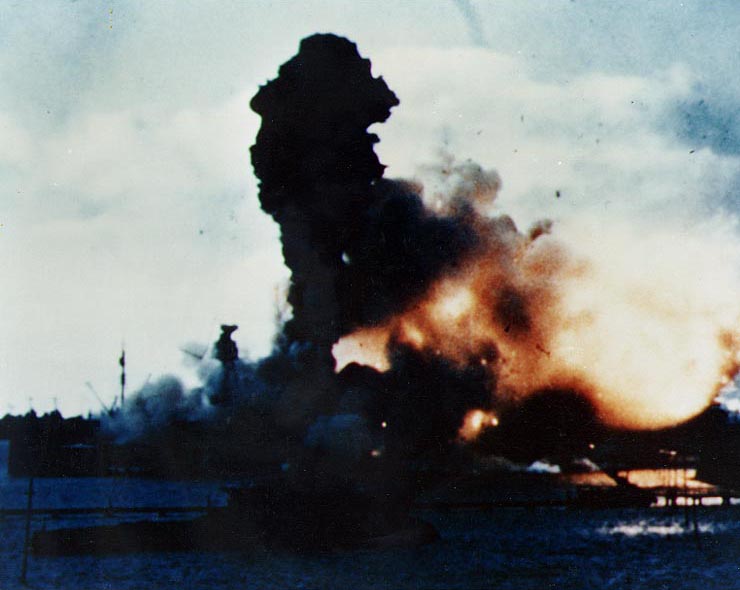
I've been thinking about this quite a lot lately. I just read a book called "The Admirals," and excellent group biography of the only four men ever to be made five-star Admirals: Halsey, King, Leahy and Nimitz. Two items in particular are worth recounting here. The first is the reticence Nimitz and Leahy in particular had about using the atomic bomb. As defacto Chariman of the Joint Chiefs (before the position existed), Leahy was intimately involved with FDR and the governments plan; Nimitz - Commander in Chief of the Pacific Fleet - would be responsible for the bombs' delivery. Both men, veterans of WWI and forty-year Navy lifers, felt that leveling cities and extinguishing civilians in the way made possible by the atomic bomb went contrary to warfare as they had learned it at Annapolis and through a lifetime of service.

Though I can't pass judgment on the decision to drop the bomb, I will say that had the war gone differently, there's no doubt that the bombings of Hiroshima and Nagasaki would have been considered war crimes, as likely would the firebombing of Dresden

Hiroshima

Nagasaki

Dresden
Four years earlier, many had been similarly shocked by the surprise bombing of Pearl Harbor. This, too, was considered by more than a few to be contrary to the conventional rules of declared warfare. Of particular note to visitors these days is the memorial to the Arizona. Just after 8 AM on December 7th, 1941, a bomb tore through the Arizona's deck into the forward magazine and exploded. The resulting blast ripped open the ship.

1,177 men died, many of them are still aboard.
The memorial is moving, beautiful, and altogether well done. The video one watches before taking a boat out to the wreck is even-handed without being cold, emotional without being maudlin. As an experience, I highly recommend it.
Rules of war change all the time, but that isn't to say they aren't real to those experiencing them. In some medieval warfare, armies were maneuvered like pieces on a chess board and the tactically superior commander was declared the winner even if no casualties occurred. We won independence on the back of guerrilla tactics that were, for the time, uncivilized. After the devastation of World War I, we decided as a species that mustard gas, for instance, was no longer an acceptable ordinance to be deployed on the battlefield. And the Geneva Convention continues to establish minimum standards for conduct in battle and off the field.

But it's one thing to say in the calm of peacetime, or in the moments before the heat of battle, that some things are off limits. I have to imagine that when the bombs fall and the bullets fly, things aren't quite so easy.
I want to share one more thing from my trip to Hawaii. While killing time at the Honolulu airport, I struck up conversation with a fellow next to me at the airport bar who turned out to have been a Navy SEAL in Vietnam and Cambodia. He - understandably - doesn't like to talk about the experiences, but after we had talked for an hour about basketball, business, and our discovered Michigan-Ohio State rivalry (and bought each other several drinks a piece), he opened up. He showed me a scar on his leg, and told me - his voice heavy with emotion - that he had been shot by a young Cambodian girl wielding an assault rifle. His voice quivering, he looked right into my eyes and said "I hope you never have to know what it's like to shoot a child."
I hope so too, and it makes me all the more grateful to the men and women who serve and keep me from having to experience things that end up all to common for them. The point, though, is that as the saying goes "no battle plan survives the first encounter with the enemy," and I would venture to say that rules of war rarely survive a full conflict intact. No one ever wants to shoot a child, but the rules change when they're shooting at you.
One more thing from our Navy SEAL friend; it's not law related, but it's worth recounting. As I was leaving, ESPN flashed something about Lebron James' salary. My new friend said "A million here, ten million there." He looked at me, "it'll never make you happy." I asked him what makes him happy, and he smiled. "My wife. My children. Learning. Any day that you learning something new is a good day. That's a good day." He leaned over and touched my arm "from a Buckeye to a Wolverine."
If you're reading this, friend, thank you for your service, and thank you for sharing.




On the Laws of War... Jim Morrow is writing a book about them, and has written several articles, if you are interested.
ReplyDelete